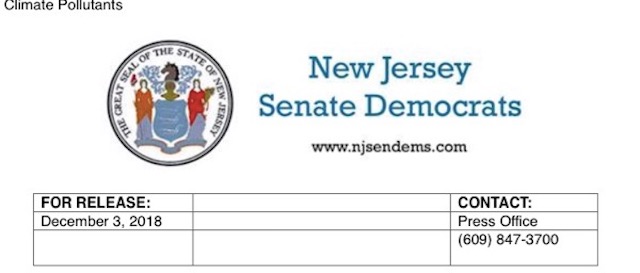Senate Committee Advances Flawed Climate Bill, Rejects Demand For Enforceable Emissions Reductions and Pollution Fees
Chairman Smith Defers To Murphy DEP On Whether To Regulate GHG Emissions
Climate Activists and Environmental Community Support Sham
Senate Democrats spin – try to shift focus to “short lived pollutants”
-
It was not the Department’s intent to establish CO2 emissions permitting and regulatory requirements through the proposed amendments. The Department has modified the rules on adoption to except CO2 from existing air pollution regulatory and reporting requirements. ~~~ NJ DEP, 2005
The Senate Environment Committee yesterday released a seriously flawed bill purported to accelerate greenhouse gas emissions reductions, a charade we predicted last week.
Committee Chairman Bob Smith rejected our requests – and the testimony of Jeff Tittel of NJ Sierra Club – to amend the bill to put teeth in it. Despite knowing exactly the charade that was underway, Tittel supported the bill.
But at least Tittel testified and requested amendments – the NJ LCV, Pinelands Preservation Alliance, & Environment NJ unconditionally supported the bill with no testimony. Where was Rethink NJ?
Importantly, Tittel also told the truth about the history of the failed 2007 Global Warming Response Act – another seriously flawed bill he supported during the Corzine administration and another charade we called out shortly after Gov. Corzine signed the bill into law in a Sunday October 7, 2007 Star Ledger Op-Ed, see: No Teeth In “Tough” Pollution Law.
 Instead – illustrating the perverse principle that “arsonists are the best firefighters” – Smith identified and praised former DEP hack Jeanne Herb (like so many former DEP hacks, currently at Rutgers) for giving him the idea for the bill (or requesting it? Or writing it? We will file an OPRA to Rutgers to find out).
Instead – illustrating the perverse principle that “arsonists are the best firefighters” – Smith identified and praised former DEP hack Jeanne Herb (like so many former DEP hacks, currently at Rutgers) for giving him the idea for the bill (or requesting it? Or writing it? We will file an OPRA to Rutgers to find out).
[Update: Rutgers denied our OPRA, covering up their role.]
The “arsonist” principle applies here because Ms. Herb was directly involved in the 2005 GHG regulation charade by her boss, Brad Campbell, who, under the guise of regulating GHG emissions as pollutants under NJ law, very cowardly and cynically then exempted them from regulatory requirements. (see above DEP quote).
Herb then served under DEP Commissioner Lisa Jackson and was involved in the continuing 2007 GHG charade of the Global Warming Response Act and RGGI.
For the whole ugly history of all that, see: A Decade After Passage of The NJ Global Warming Response Act: From “Toothless” to a “Dead Letter”
To round out the historical farce, we note that former DEP Commissioner Campbell, who deregulated GHG emissions under the guise of regulating them is now head of the Conservation Law Foundation.
Campbell’s CLF bio touts his accomplishments as NJ DEP Commissioner (2002 – 2006):
As Commissioner of the New Jersey Department of Environmental Protection, a post he held for four years, Brad set the toughest standards in the nation to protect coastal areas, streams, and rivers from stormwater pollution; initiated and negotiated the Regional Greenhouse Gas Initiative (RGGI) to control greenhouse gas emissions from power plants; and developed and secured permanent protection for more than 800,000 acres of watershed lands under threat of development in New Jersey’s Highlands region.
Not surprisingly, Campbell takes credit for negotiating RGGI – but that was a very poor negotiation because the original GHG emissions pollution “cap” was 9% ABOVE then current GHG emissions.
Campbell’s bio also is silent on his 2005 cynical charade on the regulatory front, i.e exempting GHG emissions from DEP regulatory requirements, as well as his later role in lobbying for a massive new coal power plant, Orwellianally known as “PurGen”, a $5 billion 750 MW coal plant.
Remarkably – now follow this very closely – Campbell’s recent CLF blog post also brags about a huge victory in “cutting greenhouse gases” and links to this prior post titled: CLF Victory: Highest Court in Massachusetts Enforces Global Warming Solutions Act:
In a sweeping unanimous opinion yesterday, the highest court in the Commonwealth confirmed that Massachusetts’s landmark 2008 climate protection law, the Global Warming Solutions Act, requires that the state take enforceable action to reduce greenhouse gas emissions on an annual basis in order to achieve the law’s 2050 greenhouse gas emissions reductions mandate. …
That is why CLF filed suit on behalf of a group of concerned Massachusetts teenagers and others when the state’s Department of Environmental Protection failed to promulgate regulations expressly required by the GWSA to set declining annual aggregate limits on the volume of greenhouse gases that could be emitted in the state.
Today the Court was crystal clear in handing those courageous teenagers, and the people of Massachusetts this resounding, unanimous victory: The GWSA is legally enforceable – not “merely aspirational” as the DEP repeatedly and wrongly insisted, and reducing GHG emissions to 80% of 1990 levels by 2050: “attain[ing] actual, measurable, and permanent emissions reductions in the Commonwealth” is the unambiguous law of the land!
Now recall that prior to the passage of NJ’s GWRA, Campbell laid the legal foundation for that failure in 2005 by deregulating GHG emissions!
Then consider that my 2007 Op-Ed explicitly focused on the failure to enact enforceable requirements. Note the shared use of the term “aspirational” – voluntary goals I flagged as fatal in 2007 and echoed and revived by CLF over a decade later to reach the opposite conclusion: i.e. that theMassachusetts Court’s rejection of which was the basis of a “huge” legal victory.
A decade before, in 2007, I wrote:
But problems emerge after actually reading the law and gaining an understanding of its legislative history. Contrary to media coverage and political spin, simply put, the law amounts to little more than aspirational goals and a misleading sham. Here’s why….
The law — contrary to widespread media coverage — does not legally cap greenhouse gas emissions or mandate emissions reductions on any major pollution sources. As a result, the law’s theoretically “mandatory” goals are unenforceable and therefore a fiction. They amount to the same voluntary approach backed by the Bush administration.
Finally consider that exactly the same policy, legal, and regulatory issues are now on the table in Senator Smith’s bill.
Closing the circle: From tragedy to farce: (Earth Day 2005 photo)

D.E.P. Commissioner Brad Campbell (left) argues with protestor Bill Wolfe (Coordinater for the Fast Track Appeal Campaign) outside of the RiverWinds complex prior to the start of Acting Gov. Richard Codey’s press conference announcing a plan to clean up contamination along the Delaware River. JOHN ZIOMEK/Courier-Post
Getting back to the Senate hearing, Smith then called on the DEP’s representative in the audience – presumably longtime DEP legislative liaison John Hazen – to go back and ask Commissioner McCabe if DEP would support amendments to the bill to mandate that DEP regulate GHG emissions and subject those emissions to DEP air pollution emissions fees. (currently set at $122.45 per ton).
I think we know where the Murphy Administration will come down on that, given:
1) Gov. Murphy’s failure to repeal draconian Christie Executive Orders #1 – #4;
2) DEP Commissioner McCabe’s failure to repeal and revise a host of Christie DEP regulatory rollbacks; and
3) the fact that the Gov. and DEP rely on and constantly tout rejoining RGGI as a major climate policy reform. But keep in mind that the RGGI program applies to less than 20% of NJ’s GHG emissions, that the RGGI allowance is about $3 per ton (compared to $122.45 for other air pollutants), and the NJ RGGI law has a legislative “reset” provision if the allowance exceed just $7 per ton. You can thank Senate President Sweeney for all that.
III) Democrats deny & spin
Finally, Smith voted the bill out of Committee and referred it to the Senate Budget and Appropriations Committee. That Committee is controlled by Senate President Sweeney.
I strongly doubt we will see any pro environment amendments to the bill as part of Sweeney’s intervention or that Committee’s review.
Instead, the bill will either die there (without a public hearing) or be amended with poison pills to worsen the current version.
To get a sense of where this is headed, consider finally the fact that the Senate Democrats issued a press release touting the bill, but very obviously trying to shif the focus to “short lived” GHG’s, instead of the larger flaws with respect to the bill, the DEP regulations, and the history of the GWRA and RGGI charades:
Smith Bill to Establish Timeframe for DEP to Create a Strategy to Reduce Short-Lived Climate PollutantsTRENTON – Legislation sponsored by Senate Environment and Energy Committee Chair Bob Smith would establish new timeframes for the implementation of certain requirements in the “Global Warming Response Act” (GWRA) and require the Department of Environmental Protection (DEP) to adopt a strategy to reduce short-lived climate pollutants cleared the Senate Environment and Energy Committee today.According to the Center for Climate and Energy Solutions, the main short-lived climate pollutants are black carbon, methane, tropospheric ozone and fluorinated gases. Currently, fluorinated gases (HFC’s, perfluorocarbons (PFC’s), SF6 and NF3) account for 3% of domestic greenhouse gas emissions in terms of carbon dioxide equivalency. The EPA has created several voluntary programs aimed at lowering these emissions. Due to their immense contributions to climate change, reducing short-lived climate pollutants can be very cost-effective. Actions taken in the immediate future to address them could slow the planet’s warming 0.6 degrees by the mid-century.“Abusing the use of short-lived climate pollutants represent one of the many problems of our society today, that is we only think of short-term use and not long-term use,” said Senator Smith (D-Middlesex/Somerset). “We have a real opportunity to change this culture and make sure we reduce and hopefully completely eliminate the use of short-lived climate pollutants. In order for us to mitigate the current effects of climate change that we are now witnessing, we need to make drastic changes.”The bill, S-3207, would also require the state to develop a comprehensive strategy to reduce emissions in the state of short-lived climate pollutants, such as black carbon, fluorinated gases, and methane.Within 18 months after the date of enactment of the bill, the DEP would be required to adopt rules and regulations establishing a greenhouse gas emissions monitoring and reporting program. Additionally, within 18 months after the date of enactment, and biennially thereafter, the DEP would be required to prepare a report on the status of the greenhouse gas emissions monitoring and reporting program, the current level of greenhouse gas emissions in the state, and the progress made toward compliance with the goals established in the GWRA. Finally, within one year after the date of enactment, the bill would require the DEP to prepare a report recommending additional measures necessary to reduce greenhouse gas emissions to achieve the 2050 goal.
That press release is now circulating and misleading the media and climate activists.
Sweeney is smiling – still more farce: see Global Warming Bill Hijacked.
Like they say: you can’t make this shit up.
